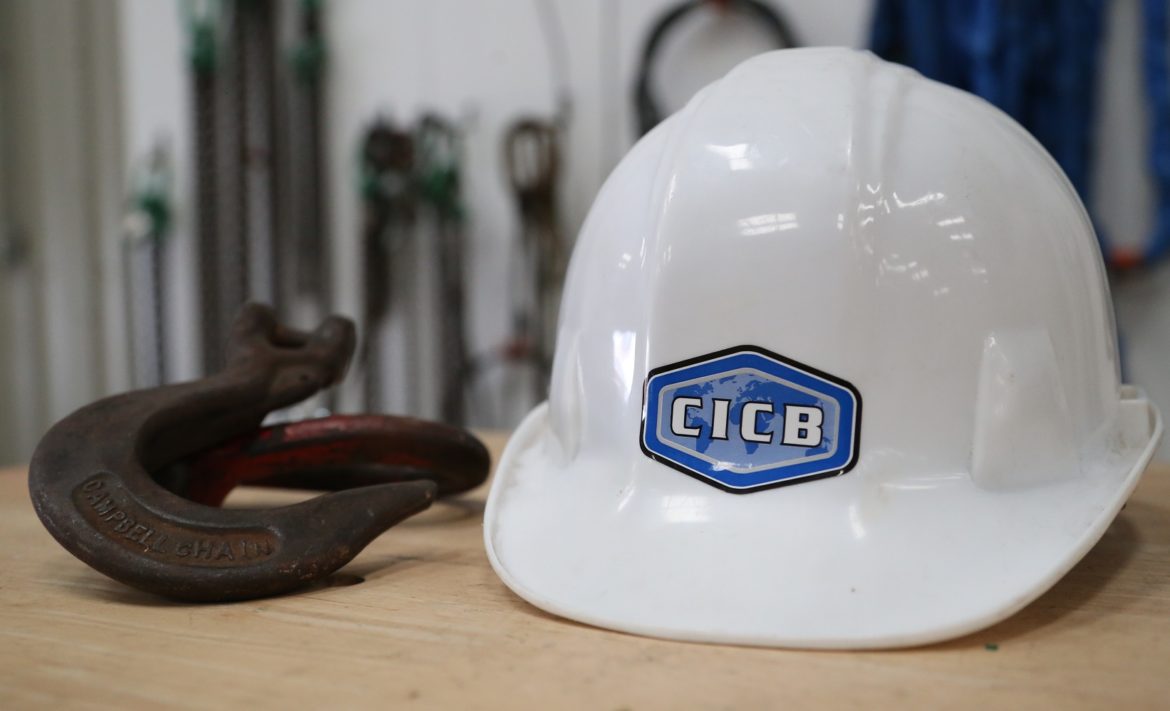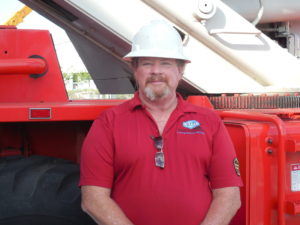
Craig Epperson, President and CEO, CICB
Last month, Crane Inspection & Certification Bureau (CICB) announced it has taken steps to add state-of-the art programs to meet the high demand for certified crane operators and riggers in Texas and the Gulf Coast region. By expanding the certification programs and classrooms and adding new equipment and dedicated lab areas, CICB is continuing its mission to upgrade the skills and certifications of the current workforce, as well as provide a continuous pipeline of trained and educated workers entering the field.
CICB’s Houston training center has purchased an additional lattice boom crane for training and NCCCO certification exams. The center has also a new CM Lab’s Vortex training simulator to support its crane operator training and certification programs. The upgraded rigging lab also houses applied training areas for load rotation, load drifting, managing the center of gravity of non-symmetrical objects, and rigging gear inspection. The facility also has dedicated lab areas for overhead crane operations, certification, and inspection; aerial lift operations and inspection; and, a future area for fall protection and communication tower rigging and safety.
Last week, Craig Epperson, president and CEO of CICB, and John O’Connor, CICB’s manager of Houston operations, shared with Crane Network their thoughts on the company’s growth in training, new technology, and crane operation as a profession.
Crane Network: Describe CICB’s growth in Texas over the last few years.
Epperson: Our growth has been tremendous over the past few years. Not only did CICB establish South Texas’s only career school, authorized by Texas Workforce Commission Career School and Colleges, to train and certify individuals, we also acquired East Texas Crane Academy, which expanded our footprint and strengthen our team.
To accommodate the increased demand for training and certification, our Houston facility has been expanded and now has three classrooms, when combined can seat 64 students. In addition, the dedicated lab areas for rigging and overhead crane operations have been upgraded. We also purchased a lattice-boom crawler crane, along with CM Lab’s Vortex crane operator training simulator.
Facilitating the growth, we have added several full time Houston-based subject matter experts as instructors, bringing our total to six with a combined expertise of more than 160 years, a manager of business development, and additional customer service and administrative personnel to the staff.
O’Connor: Along with the training center’s expansion and new equipment, we have expanded our NCCCO Certification Programs. In addition to the CCO mobile and overhead crane operator, rigger, and signal person certification programs, programs have been added for CCO articulating boom and service truck cranes, lift director, and mobile crane inspector. We even offer CCO mobile crane certification in Spanish. These programs are regularly scheduled at our training center or contracted at the client’s locations, throughout the Gulf Coast region.
To date, CICB’s accredited practical examiners have administered well over 10,000 NCCCO mobile crane practical exams and with many operators holding additional certification for related programs such as rigger, signal persons, inspector, and lift director, the actual number of exams administered is much higher.
Crane Network: What was the reason behind CICB’s expansion into the Gulf Coast region?
Epperson: The increased in demand for our services, both on-site and at our training facilities, from our clients within the refining, petrochemical, oil and gas, manufacturing and construction industries prompted our continued expansion.
O’Connor: Many organizations in the region have voiced their need for trained and certified operators, riggers, and safety personnel. By expanding our footprint deeper into this region, we have expanded training for the newly hired and the current workforce.
Crane Network: Explain what the new additions are at the Houston training center. How does the added equipment benefit students?
Epperson: The newest additions are extremely powerful in the continued success of our students. CICB is one of the only training organizations in the region with full time access to a crawler crane, located onsite and dedicated for training and exams. Having multiple other cranes onsite also allows CICB the flexibility to schedule practice time and testing, anytime, all the time.
We have also invested in CM Lab’s Vortex training simulator. The simulator, equipped with multiple large HD screens, displays telescopic mobile and lattice boom crawler crane simulations, reinforcing learning for beginners, and benefits the advanced operator with certification-level scenarios, comparable to the NCCCO exams.
O’Connor: Our crane operator training programs now include theory, simulation, and practical training. New operators can be intimidated sitting in the cab of a crane for the first time, but with simulation, the student will build their confidence on the controls, the computer system, the crane’s physics, and hone their skills on a lift. The Vortex system does a phenomenal job simulating the physical dynamics of a crane in motion, such as pendulum swings and cab movement, and allows the trainees to develop their proficiency in necessary skills, such as catching the swing.
The Vortex advanced system allows trainees to experience conditions and operations that are just not possible to train on the real equipment. For instance, the simulator can reproduce potentially hazardous situations that trainers would normally hesitate to introduce to a novice operator, such as shifting loads, blind lifts, or working around powerlines.
Our students learn good operating habits early on—before even climbing into the cab for the first time. In our experience, the skills that the student learns and develops on this simulator will transfer directly to an actual crane.
The Vortex system, however, is not just for new operators. With the data and metrics that the simulator records, we have a great platform to evaluate and train existing operators, thus furthering their skill set. The trainee can be shown how they performed based on accrued data that is easy to evaluate and comprehend. We can also replay the simulation to demonstrate areas of improvement, again increasing an operator’s skill level.
Crane Network: With virtual reality making its way into training, what are your views on this technology? Pros/cons?
Epperson: There are a wide range of simulation platforms on the market today, all with a certain level of value, but the simulation device that has distinguished itself above all others was the Vortex Advantage simulator from CM Labs. The system offers the operators the most realistic experience parallel to an actual crane, without the cumbersome head gear and the inability to see the hand controls of virtual reality programs.
CICB’s stance has long been that hands-on training is the best method for crane operators. Simulators are an excellent teaching tool, and will assist in training, but can never be a substitute for hands-on training on actual equipment.
O’Connor: Nothing will replace actual seat time in a crane. Simulator training, used as a training aid, allows trainees to obtain experience with crane operations without the risk or intimidation associated with a full-size machine.
Weather and outside factors can be added to the simulation as the trainee progresses and even simulated accidents can also be a useful training tool. Trainees can be placed in unfavorable situations, learn how to react correctly and review the circumstances to prevent the situation to begin with.
Simulators are not just for new learners, employers can also have new hires’ skills assessed before allowing them on the controls of a million-dollar piece of machinery.
Crane Network: Are we seeing more of an interest in crane operation as a profession today, compared to years past? Why or why not?
Epperson: Unfortunately, right now there is a significant shortage of crane operators and riggers, and there has been for quite a few years. Today’s generation has been taught that nothing can be achieved without a college degree. Therefore, the trade crafts have seen a reduction in interest as more, and more young people opt for a college education versus learning a trade.
In response to the shortage of skilled labor and the demand for highly trained and certified crane operators and riggers, CICB has established the only career school in the Gulf Coast area, approved by Texas Workforce Commission, to provide training to individuals for employment in the crane and lifting industry.
CICB has and continues to sponsor events which promote careers in the crane and rigging industry, such as Lift & Move USA, which showcases the opportunities to building rewarding and successful careers.
O’Connor: We, at CICB, are seeing more interest in crane operations. With the construction booming from South Texas to Louisiana, we have had numerous inquiries from not only those wanting to enter the field, but also from those wishing to upgrade their skills.
Crane Network: Do you foresee the new IUOE training facility in Texas having an impact on CICB?
Epperson: We do not see the new IUOE training facility affecting us in anyway. CICB has always welcomed competition, as it fosters growth, and offers options to potential candidates. There are always those that want to join the union, and those that don’t. IUOE’s new facility will make it easier for those that do to receive the proper training, and entry into an apprenticeship program. Hopefully this new facility will peak the interest of today’s youth, and bring much needed bodies into a professional trade.
O’Connor: No, we do not foresee IUOE having an impact on us. Many union members contact CICB for their NCCCO training and exams.
Crane Network: Where are we today with crane operator certification? What are your thoughts on the proposed extension?
Epperson: We understand the need for OSHA to complete its evaluation and recommendations, particularly those related to crane capacity and the definitions for employee certification and qualification.
O’Connor: Many proactive industries and insurance companies already require NCCCO certifications for crane operators and riggers.
Crane Network: In your view, how does CICB differ from other training programs available in the industry?
Epperson: CICB’s training programs differ from others in two very noticeable ways. First and foremost, our programs taught by subject matter experts with years of direct industry experience that are not only CCO Certified, but have been professional trained as trainers by the Bob Pike Group. Secondly, all our programs are fully customizable to our clients’ needs, whether we’re at their site or ours.
O’Connor: Setting our instructors apart from others in the industry is the amount of real life experience along with their diversity. This knowledge and experience cannot be learned in a classroom. They bring their own stories and “have been in the same situation” which helps new operators and riggers relate to the instructor. Their trainer credentials are enhanced by ongoing training seminars. All our instructors are not only NCCCO Accredited Practical Examiners, but are CCO Certified as Mobile, Overhead & Articulating Crane Operators, Riggers, Signalpersons, Lift Directors and Crane Inspectors. CICB’s instructors have been awarded the prestigious Top Trainer Award in 2016, 2014, 2013, 2012, 2011 and 2009.
About the Interviewees
Craig Epperson is president & CEO of Crane Inspection & Certification Bureau LLC. His professional resume spans more than 50 years of diverse and all-inclusive activities in the domestic and international services business, including the management and supply of engineering, design, construction, training, facility and equipment inspections, consulting, and similar services for U.S. and international-based private industry and government institutions. His career includes positions in chemical engineering, project engineering, project management, construction management, sales, marketing, contracts management, strategic planning, senior executive management, business owner, and board member of an international manufacturing company. Epperson is a U.S. Navy veteran, a University of Arkansas chemical engineering graduate, and an advanced management studies graduate from the Amos Tuck School of Business.
John O’Connor is CICB’s manager of Houston operations. He has held the position of senior instructor/inspector for CICB since 2006 and has a total of 28 years of experience in training, inspections, operations, planning, maintenance, administration, and personnel management for various types of lifting and earthmoving equipment. He maintains a high level of proficiency in teaching crane and heavy equipment operations, inspections, and rigging using best practices, applicable OSHA, ASME, and API standards and regulations. O’Connor holds NCCCO certifications for operator, inspector, rigger, signal person, and lift director. He is also a NCCCO-accredited practical examiner for mobile and articulating boom cranes, overhead cranes, rigger, and signal person.


